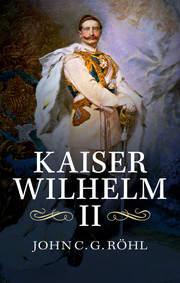Book contents
- Frontmatter
- Dedication
- Contents
- List of figures
- Acknowledgements
- Preface to the English edition
- Preface to the German edition
- Acknowledgements
- Overview: Wilhelm the Last, a German trauma
- Part I 1859–1888: The Tormented Prussian Prince
- 1 The ‘soul murder’ of an heir to the throne
- 2 Ambivalent motherhood
- 3 A daring educational experiment
- 4 The conflict between the Prince of Prussia and his parents
- 5 1888: the Year of the Three Kaisers
- Part II 1888–1909: The Anachronistic Autocrat
- Part III 1896–1908: The Egregious Expansionist
- Part IV 1906–1909: The Scandal-Ridden Sovereign
- Part V 1908–1914: The Bellicose Supreme War Lord
- Part VI 1914–1918: The Champion of God’s Germanic Cause
- Part VII 1918–1941: The Vengeful Exile
- Notes
- Index
3 - A daring educational experiment
Published online by Cambridge University Press: 05 September 2014
- Frontmatter
- Dedication
- Contents
- List of figures
- Acknowledgements
- Preface to the English edition
- Preface to the German edition
- Acknowledgements
- Overview: Wilhelm the Last, a German trauma
- Part I 1859–1888: The Tormented Prussian Prince
- 1 The ‘soul murder’ of an heir to the throne
- 2 Ambivalent motherhood
- 3 A daring educational experiment
- 4 The conflict between the Prince of Prussia and his parents
- 5 1888: the Year of the Three Kaisers
- Part II 1888–1909: The Anachronistic Autocrat
- Part III 1896–1908: The Egregious Expansionist
- Part IV 1906–1909: The Scandal-Ridden Sovereign
- Part V 1908–1914: The Bellicose Supreme War Lord
- Part VI 1914–1918: The Champion of God’s Germanic Cause
- Part VII 1918–1941: The Vengeful Exile
- Notes
- Index
Summary
What the doctors could not achieve with their ‘animal baths’ and head- and arm-stretching machines therefore had to be accomplished by a purposeful upbringing. Precisely because of her firstborn son’s infirmities, it remained the Crown Princess’s goal to mould him into an exemplary liberal, reforming monarch. In 1864 she wrote to Queen Victoria saying that it was her dearest wish that Wilhelm should grow up to be ‘like dear Papa and become a great man, a second Frederick the Great – but one of another kind’. In the autumn of 1866, on the recommendation of the liberal diplomat Sir Robert Morier, at that time British minister in Darmstadt, this task was entrusted to the former tutor of Count Emil Görtz in the small Hessian town of Schlitz, Dr Hinzpeter – an eccentric choice in more ways than one. The conditions that Hinzpeter laid down – his pupil had to be entirely ‘in my power’, and he was not prepared to play the part of a ‘play-fellow for a little boy’ – showed how rigorously he intended to proceed. His Spartan educational principles, combined with the Crown Princess’s high expectations, brought young Wilhelm even more suffering and a joyless childhood. Nevertheless, one should not exaggerate the severity of Hinzpeter’s regime in these early years. Thus it is a propaganda myth, concocted by Wilhelm II in the childhood recollections he dictated during his years in exile, that Hinzpeter used appallingly painful methods to teach his pupil to ride, allowing him to fall repeatedly from the saddle for days and weeks on end until he had found his balance. For one thing, it is quite unthinkable that his parents and the doctors would have permitted the disabled heir presumptive to risk serious injury in this way.
- Type
- Chapter
- Information
- Kaiser Wilhelm IIA Concise Life, pp. 14 - 21Publisher: Cambridge University PressPrint publication year: 2014



